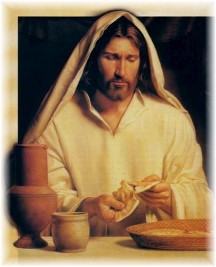“He did not enter by means of
the blood of goats and calves; but He entered the Most Holy Place once
for all by His own blood, thus obtaining eternal redemption”
(Hebrews
9:12). “We have been made holy through the sacrifice of the body of
Jesus Christ once for all”
(Hebrews 10:10).
a name
For the Son of God
who came;
Ruined sinners to
reclaim,
Hallelujah! What a
Savior!
 It seems that each
It seems that each
time Brooksyne and I donate blood a reflective
illustration comes to mind. On Saturday morning we visited the
“bloodmobile” and the procedure was routine. When the phlebotomist was
finished she placed a gauze pad over the collection site and told me to
raise
my arm straight up. I’ve done that many times since I began donating
as a teenager almost 50 years ago. But this time I immediately
thought of Christ’s blood sacrifice on my behalf and, with my upraised
hand, I quietly offered thanks to
God for His atoning blood sacrifice.
Yesterday in our
church service we remembered the final blood sacrifice that
Jesus made by sharing in Communion together as He taught us to
do. At the time of the first “Lord’s Supper” Jesus looked ahead
to the sacrifice He would make the next day and spoke of His broken
body and shed blood. Since that time His followers look back on that
great blood sacrifice each time they read, hear, or repeat Jesus’
words, “Do this in remembrance of Me”.
 During the Communion
During the Communion
service, as the elements were being passed out to
the congregation, yesterday we sang with the choir, “O The Blood” which
has these
recurring lines:
washes me
O the blood of Jesus
shed for me
What a sacrifice
that saved my life
Yes, the blood, it
is my victory
“Once for all” Today
we focus on a three-word phrase from the
daily texts that is very significant .
“Once for all” translates the single Greek word ἐφάπαξ “ephapax“. The
sense in these texts is not “once for
all people”, although the scope
of redemption surely extends to all people, but in these verses it
means “once for all time”.
Once for all is a powerful contrast to the
sacrifice of the high
priest, who repeatedly entered the Most Holy Place with blood
sacrifices once a
year. Jesus’ sacrifice was complete and did not need to be repeated.
The work of atonement is finished and therefore, praise the Lord, it
cannot be unfinished!
The word, “ephapax”
points to the single act of Christ’s sacrifice that obtained
eternal redemption and provided the only means in which sinful humans
are made holy in God’s sight. Thus the finality of Christ’s
utterance from the Cross, “It is
finished”.
Our service ended yesterday with the congregation singing an
adaptation of an old Philip P. Bliss number that has been wonderfully
rediscovered titled, “Man Of Sorrows”. In this hymn each verse
progresses from His coming to earth to save sinners, His being mocked,
ridiculed and rejected, His death on the cross, His resurrection and
ascension, to His second coming.
Hallelujah! Hallelujah! What a Savior!
Be encouraged today,
Stephen & Brooksyne Weber





